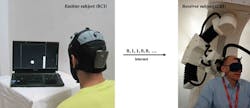Beyond Wi-Fi: Direct brain-to-brain communication via Internet demonstrated in human subjects
As recorded at ScienceDaily, Beth Israel Deaconess Medical Center has revealed that in a first-of-its-kind study, an international team of neuroscientists and robotics engineers have demonstrated the viability of direct brain-to-brain communication in humans via Internet technology.
According ScienceDaily's write-up, "Recently published in PLOS ONE [an an inclusive, peer-reviewed, open-access resource from the Public Library of Science] the highly novel findings describe the successful transmission of information via the Internet between the intact scalps of two human subjects -- located 5,000 miles apart."
"We wanted to find out if one could communicate directly between two people by reading out the brain activity from one person and injecting brain activity into the second person, and do so across great physical distances by leveraging existing communication pathways," explained research co-author Alvaro Pascual-Leone, MD, PhD, Director of the Berenson-Allen Center for Noninvasive Brain Stimulation at Beth Israel Deaconess Medical Center (BIDMC) and Professor of Neurology at Harvard Medical School.
Dr. Pascual-Leone continued, "One such pathway is, of course, the Internet, so our question became, 'Could we develop an experiment that would bypass the talking or typing part of Internet and establish direct brain-to-brain communication between subjects located far away from each other in India and France?'"
It turned out the answer was "yes."
"It is kind of technological realization of the dream of telepathy, but it is definitely not magical," Giulio Ruffini, theoretical physicist and another co-author of the research, noted to AFP, as reported by The Telegraph (UK).
Full stories:Direct brain-to-brain communication demonstrated in human subjects (sciencedaily.com)
Brain-to-brain 'telepathic' communication achieved for first time (www.telegraph.co.uk)
